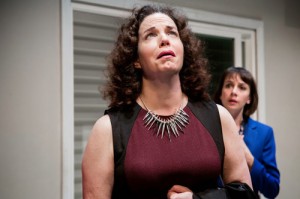
 Highly Recommended ****Both Laura Marks’ play “Bethany” and The Gift Theatre’s production of it are somewhat unique. Although a contemporary story, Ms. Marks uses sophisticated and primal literary techniques focused on character, such as foil, symbolism, and archetype, to create meaning. However, she is most skilled in plot, creating increasing dramatic tension as the play reaches its conclusion (in this case, resolution would be a misnomer). Though the theatre and stage are very small, the play calls for a relatively large cast, and two separate settings, but Courtney O’Neill and Isabel Strauss have created a backdrop that convincingly switcs back and forth between an unoccupied home and a Saturn dealership while practical and effective blocking by director Marti Lyons, ensures that the many characters never make the stage or play feel claustrophobic.
Highly Recommended ****Both Laura Marks’ play “Bethany” and The Gift Theatre’s production of it are somewhat unique. Although a contemporary story, Ms. Marks uses sophisticated and primal literary techniques focused on character, such as foil, symbolism, and archetype, to create meaning. However, she is most skilled in plot, creating increasing dramatic tension as the play reaches its conclusion (in this case, resolution would be a misnomer). Though the theatre and stage are very small, the play calls for a relatively large cast, and two separate settings, but Courtney O’Neill and Isabel Strauss have created a backdrop that convincingly switcs back and forth between an unoccupied home and a Saturn dealership while practical and effective blocking by director Marti Lyons, ensures that the many characters never make the stage or play feel claustrophobic.
Before the action of the play begins, we are given a mock prologue by Charlie (James D. Farrugio): one of the plays’ characters. It introduces him as a snake oil salesman who is part religious-revivalist and part motivational-speaker. As the play opens, Crystal, alias Bethany, enters a house where she finds a man looking considerably the worse for wear called Gary. It soon emerges that neither are supposed to be there, and they agree to share the squat on amicable terms. Crystal works at the Saturn dealership on straight commission, and is trying to sell a car to the aforementioned motivational-revivalist, Charlie, who returns each day to speak to her about it. Crystal is trapped in these two spaces (and sets) because she is trying to regain custody of her daughter who was put in the charge of the state when Crystal became homeless. It is a condition of her regaining custody that she has an income and a home.
At one point near the end of the play, she tells her social worker, Toni (a professional Susaan Jamshidi), that she would do anything for her daughter, and the audience is charged with evaluating this claim as we watch Crystal’s actions which are at times ruthless, and at other times, horrific. In fact, they seem more the province of a gifted saleswoman than a desperate mother’s frustrated love. In particular, her choice to use Charlie, and reject any help that Gary offers and ultimately reject Gary’s very humanity, are acts impossible not to condemn outright as the most extreme form of moral turpitude. Fortunately, the breathtaking energy and determination with which Ms. Clemens plays the part means that we watch Crystal with fascination, and are never quite able to fully condemn her character, even while unequivocally denouncing her actions.
James D. Farruggio looks, acts, and is dressed perfectly as Charlie. He’s a caricature, but I think that is what the playwright had in mind, and he executes the caricature dutifully, shifting attention to his foil, Gary, a far more round character and an update of “the holy fool.” Gary is clearly mentally ill, but there is something in his delusions that sounds like a hidden and twisted truth, and there is a goodness and uncompromising moral integrity about him. In an age when mental illness is so often associated with gun violence in the media and news, Paul D’Addario manages to look and act homeless as Gary in way that never-ever seems threatening until Crystal misreads certain actions as hostility towards Bethany, Crystal’s alias, is the town where Lazarus is said to have died, and it means “house of misery.” 
That is clearly where Crystal is at the end of the play, and unlike in the New Testament, we do not get the certain sense that anyone will be there to resurrect what she has destroyed. Nor is there any promise she will not be found out. In fact, we wonder if she wouldn’t have been better off accepting Gary’s promises of help and salvation. The supporting cast was also very impressive, but I want to specifically mention Anne Bowman who portrays Patricia with perfect verisimilitude and believability, despite the fact that Ms. Bowman is given very little time on stage by the playwright to create the character while Kirby O’connell as Shannon effectively provides comic relief albeit by end of the play any humor seems extraneous. Great costume design by Kristy Hall clearly helped give all the actors a defined space within which to portray their character, not always an easy task in contemporary plays.
“Bethany” runs at The Gift Theatre which located at 4802 N. Milwaukee. It runs Thursdays through Saturdays at 7:30 p.m. and Sundays at 2:30 p.m. through November 23. Single tickets, 20-30 dollars, are available at http://www.thegifttheatre.org/ or by calling the box office at 773-283-7071. Prices vary from performance to performance, but discounts are available for seniors and students.
To see what others are saying, visit www.theatreinchicago.com, go to Review Round-up and click at “Bethany”
her.






More Stories
“Guys & Dolls”
“The Music Man”
“The S Paradox” reviewed by Julia W. Rath